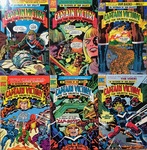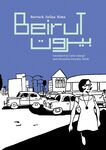
This issue features an interview with The Ladydrawrs Comic Collective’s Melissa Mendes and Anne Elizabeth Moore by Zach Mason, a review of Haruo Musuko’s Wandering Son by Laura Knetzger, a review of Yuichi Yokoyama’s World Map Room by (moonlighting Paris Review editor) Nicole Rudick, a conversation between Mia Schwartz and Ben Urkowitz, and an interview of Walker Mettling of the Providence Comics Consortium by Zach Mason. Best issue yet.
The cover was drawn by Melissa Mendes.
ATTENTION INTERNATIONAL CUSTOMERS: As this item is so light weight, we can ship it for substantially less via First Class International Mail than the PayPal shipping calculator will register should you simply add to cart and checkout ($10.00 vs. $24.95). So, any international customer interested in ordering issues of Comics Workbook Magazine can save $14.95 by emailing us directly at copacetic@copacetic.biz and requesting a custom PayPal invoice. PLEASE NOTE that First class may add a week or more to the delivery time when compared to Global Priority Mail. (On the other hand, you can order up to five copies and will still only be billed $24.95 for shipping through the standard PayPal checkout).

25th Anniversary Issue!
Includes fifty-page timeline of TCJ; 10 pages of TCJ testimonials; essay on the origins of TCJ by Ted White; editorials on TCJ-vibes by Anne Elizabeth Moore and Gary Groth; more!
Some edgewear

By far the most substantial entry yet published under the Critical Cartoons imprint, Uncivilized Book's series of comics analysis, Elizabeth Anne Moore's Sweet Little Cunt provides fresh perspectives and important insights into the life and work of Julie Doucet, the most significant North American female comics creator of the late 1980s and early 1990s. Doucet's highly imaginative, idiosyncratic, absorbing, labor intensive, trailblazing, gender-bending comics, made primarily for her personal (single-creator) anthology series, Dirty Plotte (Note: for those unaware, plotte is French for cunt, allowing Doucet's series to slide under the Anglophone radar – and thus the title of Moore's book) were game changers in more ways than one. Her imagination, degree of craft, size of output, and artistic fearlessness put her creative talent on par with the best comics being done during that time and conclusively cracked the alternative/independent comics boys' club. A true original, Doucet explored – and contested – definitions of gender and mental health in ways at once humorous and scary, but ultimately empowering. Anyone looking for an intellectual framework within which to better appreciate her work need look no further: this is it.










